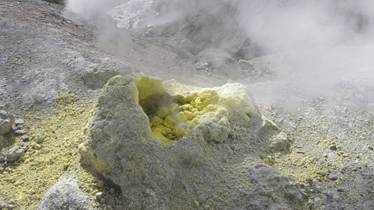New Age Traveler
From Iceland’s volcanic springs to a lab in South Denmark; does the microbe Sulfolobus. islandicus hold the key to a drug’s safe transit through the gut?

The acidic conditions of the human gut pale in comparison to the microbe Sulfolobus islandicus’ 75 °C, pH 2 Nordic abode. Millions of years of evolution in these harsh conditions have given the microbe a resilient lipid exterior – that could potentially be interesting for drug development purposes.
“S. islandicus belong to the Archaea – a domain of single-celled microorganisms – and like all archaea it contains lipids that are stable against premature degradation and thus suited to lipid-based oral drug delivery-systems that are less sensitive to bile salts,” says Martin Brandl, a professor at University of Southern Denmark. He and his colleagues have isolated lipids from the volcanic spring dwelling microbe to construct a nano-capsule that they believe can transport drugs safely through the stomach (1). This feature appears especially promising for the delivery of protein- and peptide-drugs, many of which currently cannot be administered orally due to their inherent instability in the stomach and duodenum.
The researchers were inspired by Gert Fricker who isolated tetraether lipids (TELs) from S. acidocaldrius – another species in the Sulfolobus genus – to produce liposomes for drug delivery (2). “This led us to search for other sources and other types of TELs, and we ended up with S. islandicus as the first species we investigated further,” says Alexander Treusch, co-author of the paper, and associate professor at the Nordic Center for Earth Evolution.
The researchers extracted the S. islandicus’ membrane lipids from the cell mass, which they characterized using mass-spectrometry. “Mass spectrometry indicated that the membrane lipids belonged to the class of di-ether- or tetra-ether-lipids, which are regarded as essential for stability towards acidic pH and enzymatic cleavage (lipolysis),” explains Brandl. The team then used the lipids contained within the raw lipid extract to generate bilayer-vesicles – in combination with conventional phospholipids and cholesterol – using film-hydration and filter-extrusion. The result? The vesicular drug carrier was more stable than traditional drug delivery vessels when exposed to the human intestinal tract.
But although the results are promising, scale up could be an issue since it is difficult to produce the amount of lipid necessary for drug formulation. Treusch adds, “S. islandicus grows best at high temperatures (70-80 °C) and therefore cultivation is challenging. We only have the equipment for small cultures at the moment, so this will be a bottleneck in the future. But you have to start somewhere!”
The next step for the group is to find cheaper, more easily exploitable sources of TELs. “The amounts of TELs and conventional phospholipids, as well as other compounds in the formulations, also leaves room for optimization,” says Treusch. “The goal here is to offset a part of the cost of the use of TELs by achieving higher oral bioavailability of the drug, which will open the doors for real world applications.”
- S. M. Jensen et al. Liposomes Containing Lipids from Sulfolobus islandicus Withstand Intestinal Bile Salts: An Approach for Oral Drug Delivery? Int. J. Pharm. 493(1-2) 63-69 (2015). PMID: 26192627
- .Parmentier et al. Oral Peptife Delivery by Tetraether Lipid Liposomes, Int. J. Pharm. 415(1-2), 150-7 (2011). PMID: 21664955



















